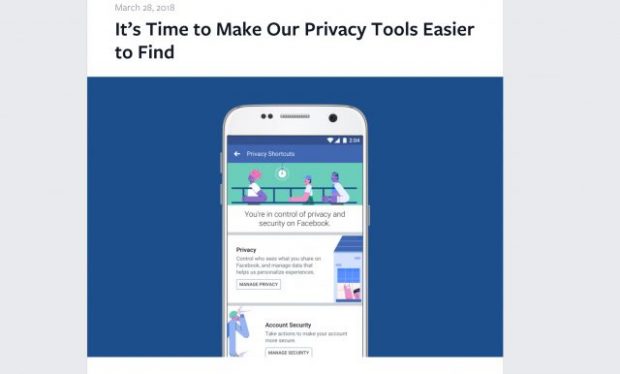Facebook Deputy GC Details Plan to Increase User Data Privacy, Transparency
Facebook's vice president and deputy general counsel Ashlie Beringer co-authored a blog post detailing how the company is attempting to make its privacy tools and settings easier to find.
March 28, 2018 at 07:08 PM
3 minute read
The original version of this story was published on The Recorder

It's been a rough week for Facebook Inc., as the Menlo Park-based company maneuvers through the backlash of the Cambridge Analytica snafu, which exposed data from more than 50 million of the platform's users. Since news broke earlier this month, Facebook's seen an influx of lawsuits and criticism over its lack of transparency and protection of user's private data.
On Wednesday morning, the social media company's vice president and deputy general counsel Ashlie Beringer published a blog post co-authored with Erin Egan, Facebook's VP and chief privacy officer, policy, detailing how the company will make its privacy tools and settings easier to find.
➤➤ Want more news from the intersection of law and technology? Check out What's Next, a new briefing from Law.com covering key developments in data privacy, AI, cryptocurrency and more. Learn more and sign up here.
“Last week showed how much more work we need to do to enforce our policies and help people understand how Facebook works and the choices they have over their data,” Beringer and Egan wrote. “We've heard loud and clear that privacy settings and other important tools are too hard to find and that we must do more to keep people informed.”
Beringer, who moved in-house to Facebook from Gibson, Dunn & Crutcher in 2013, pointed out that the company has moved the settings to a single location, making it easier for users to find what they're looking for. Previously, settings were spread across 20 pages, according to the post.
The company has also created a Privacy Shortcuts menu, in response to criticism that privacy settings were hidden and hard to navigate on the platform.
“People have also told us that information about privacy, security and ads should be much easier to find,” wrote Beringer and Egan. “The new Privacy Shortcuts is a menu where you can control your data in just a few taps, with clearer explanations of how our controls work. The experience is now clearer, more visual, and easy-to-find.”
Privacy settings accessed through the new shortcuts page will allow users to review what they've posted or deleted, ask for two-factor authentication and control what advertisements they see.
The blog post also pointed out Facebook's new “Access Your Information” page, which will allow users to see what they've shared and manage old posts. Beringer and Egan wrote that the new page is where users will go to “delete anything from your timeline or profile that you no longer want on Facebook,” or to just discover what information Facebook has.
Users will also be able to download a copy of all the data they've shared to Facebook.
“In the coming weeks, we'll be proposing updates to Facebook's terms of service that include our commitments to people,” wrote Beringer and Egan. “We'll also update our data policy to better spell out what data we collect and how we use it. These updates are about transparency—not about gaining new rights to collect, use or share data.”
This content has been archived. It is available through our partners, LexisNexis® and Bloomberg Law.
To view this content, please continue to their sites.
Not a Lexis Subscriber?
Subscribe Now
Not a Bloomberg Law Subscriber?
Subscribe Now
NOT FOR REPRINT
© 2025 ALM Global, LLC, All Rights Reserved. Request academic re-use from www.copyright.com. All other uses, submit a request to [email protected]. For more information visit Asset & Logo Licensing.
You Might Like
View All
Kraken’s Chief Legal Officer Exits, Eyes Role in Trump Administration
3 minute read

Silicon Legal: Tech Companies Stand Up and Speak Out Against Texas Abortion Law

Trending Stories
- 1US DOJ Threatens to Prosecute Local Officials Who Don't Aid Immigration Enforcement
- 2Kirkland Is Entering a New Market. Will Its Rates Get a Warm Welcome?
- 3African Law Firm Investigated Over ‘AI-Generated’ Case References
- 4Gen AI and Associate Legal Writing: Davis Wright Tremaine's New Training Model
- 5Departing Attorneys Sue Their Former Law Firm
Who Got The Work
J. Brugh Lower of Gibbons has entered an appearance for industrial equipment supplier Devco Corporation in a pending trademark infringement lawsuit. The suit, accusing the defendant of selling knock-off Graco products, was filed Dec. 18 in New Jersey District Court by Rivkin Radler on behalf of Graco Inc. and Graco Minnesota. The case, assigned to U.S. District Judge Zahid N. Quraishi, is 3:24-cv-11294, Graco Inc. et al v. Devco Corporation.
Who Got The Work
Rebecca Maller-Stein and Kent A. Yalowitz of Arnold & Porter Kaye Scholer have entered their appearances for Hanaco Venture Capital and its executives, Lior Prosor and David Frankel, in a pending securities lawsuit. The action, filed on Dec. 24 in New York Southern District Court by Zell, Aron & Co. on behalf of Goldeneye Advisors, accuses the defendants of negligently and fraudulently managing the plaintiff's $1 million investment. The case, assigned to U.S. District Judge Vernon S. Broderick, is 1:24-cv-09918, Goldeneye Advisors, LLC v. Hanaco Venture Capital, Ltd. et al.
Who Got The Work
Attorneys from A&O Shearman has stepped in as defense counsel for Toronto-Dominion Bank and other defendants in a pending securities class action. The suit, filed Dec. 11 in New York Southern District Court by Bleichmar Fonti & Auld, accuses the defendants of concealing the bank's 'pervasive' deficiencies in regards to its compliance with the Bank Secrecy Act and the quality of its anti-money laundering controls. The case, assigned to U.S. District Judge Arun Subramanian, is 1:24-cv-09445, Gonzalez v. The Toronto-Dominion Bank et al.
Who Got The Work
Crown Castle International, a Pennsylvania company providing shared communications infrastructure, has turned to Luke D. Wolf of Gordon Rees Scully Mansukhani to fend off a pending breach-of-contract lawsuit. The court action, filed Nov. 25 in Michigan Eastern District Court by Hooper Hathaway PC on behalf of The Town Residences LLC, accuses Crown Castle of failing to transfer approximately $30,000 in utility payments from T-Mobile in breach of a roof-top lease and assignment agreement. The case, assigned to U.S. District Judge Susan K. Declercq, is 2:24-cv-13131, The Town Residences LLC v. T-Mobile US, Inc. et al.
Who Got The Work
Wilfred P. Coronato and Daniel M. Schwartz of McCarter & English have stepped in as defense counsel to Electrolux Home Products Inc. in a pending product liability lawsuit. The court action, filed Nov. 26 in New York Eastern District Court by Poulos Lopiccolo PC and Nagel Rice LLP on behalf of David Stern, alleges that the defendant's refrigerators’ drawers and shelving repeatedly break and fall apart within months after purchase. The case, assigned to U.S. District Judge Joan M. Azrack, is 2:24-cv-08204, Stern v. Electrolux Home Products, Inc.
Featured Firms
Law Offices of Gary Martin Hays & Associates, P.C.
(470) 294-1674
Law Offices of Mark E. Salomone
(857) 444-6468
Smith & Hassler
(713) 739-1250






